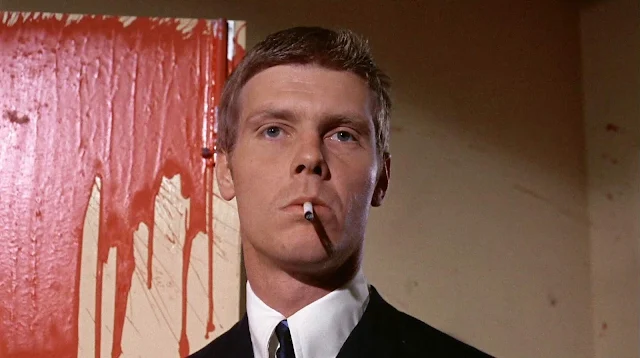Atlantis: The Lost Continent (George Pal, 1961)
Cast: Sal Ponti (as Anthony Hall), Joyce Taylor, John Dall, William Smith, Edward Platt, Frank DeKova, Barry Kroeger, Edgar Stehli, Wolfe Barzell, Jay Novello, Paul Frees (voice). Screenplay: Daniel Mainwaring, based on a play by Gerald Hargreaves. Cinematography: Harold E. Wellman. Art direction: George W. Davis, William Ferrari. Film editing: Ben Lewis. Music: Russell Garcia.
Before there were computers to mess around with, before motion capture and CGI, George Pal was known as a master of practical special effects: using models and miniatures, stop motion and camera tricks in the films he produced in the 1950s – classics like Destination Moon (Irving Pichel, 1950), When Worlds Collide (Rudolph Maté, 1951), and The War of the Worlds (Byron Haskin, 1953) – and the ones he directed, including Tom Thumb (1958) and The Time Machine (1960). But by the time he got to Atlantis: The Lost Continent, the crumbling studio system no longer was willing to foot the bill for his brand of sci-fi and fantasy. Pal was reduced to borrowing footage from older films like Quo Vadis (Mervyn LeRoy, 1951) and The Naked Jungle (Byron Haskin, 1954), and even his own The Time Machine to piece out the scenes of the destruction of Atlantis. Keen-eyed watchers of the movie have recognized some of the props and set decor from older films, such as the giant pagan idol that dominates one scene; it had been warehoused after use in The Prodigal (Richard Thorpe, 1955). Tom Thumb had featured stars like Russ Tamblyn, Peter Sellers, and Terry-Thomas, and The Time Machine starred the up-and-coming Rod Taylor, but the cast of Atlantis: The Lost Continent is decidedly second- and even third-tier. It would be the last theatrical film for John Dall, who had never quite made it to major stardom, and the male lead in the film was a Philadelphia songwriter named Sal Ponti trying to break into acting as Anthony Hall. He wound up in small roles on TV series, as did the female lead, Joyce Taylor. So all in all, Atlantis is a decidedly second-hand affair, with some narrative gaps and a lot of sword-and-sandal clichés. Still, Pal was no slouch at making do with what he had on hand, and while the movie is no sleeper hit or even cult classic, it has some entertaining moments.











.jpg)





.jpg)




.jpg)
.jpeg)
.jpeg)













.jpeg)













.jpg)


